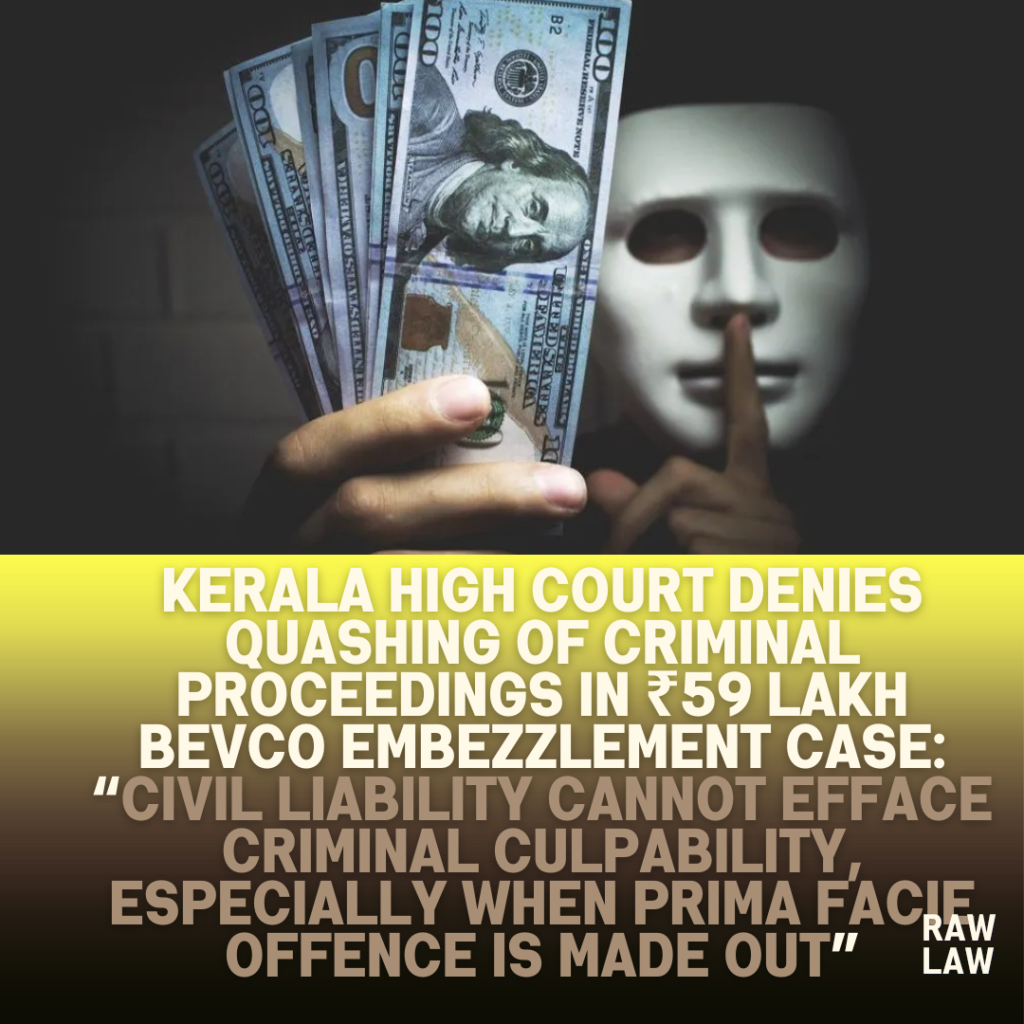Court’s Decision
The Kerala High Court dismissed the petition under Section 528 of the Bharatiya Nagarik Suraksha Sanhita, 2023, filed by accused Nos. 3 and 5 in the ₹59,06,557 embezzlement case involving the Kerala State Beverages Corporation. The Court held that there was sufficient material to proceed to trial, and the contention of res judicata based on a prior writ judgment concerning civil liability could not be invoked to thwart a criminal prosecution. The interim stay on further proceedings in C.C. No. 19/2024 was also vacated.
Facts
The petitioners, who were Class IV employees at Bevco’s Shop No. FL 1 5002 in Changanassery, were implicated along with others in the alleged misappropriation of ₹59,06,557 by forging stock and sales records between December 1, 2018, and March 17, 2019. The FIR and final report accused all seven employees of forging documents, misusing their positions, and committing criminal breach of trust and cheating under various IPC provisions and Section 13(1)(c) of the Prevention of Corruption Act, 1988.
Issues
- Whether the criminal proceedings against the petitioners are liable to be quashed on the ground of res judicata due to a prior writ judgment?
- Whether the petitioners, being Class IV employees, can be held culpable for the alleged misappropriation?
Petitioners’ Arguments
The petitioners contended that:
- They had no managerial or financial role in the liquor sales or records.
- They were merely Class IV staff and had no hand in the transactions leading to the alleged misappropriation.
- A prior common judgment (Annexure A3) in a writ petition had already examined their liability and set aside related service circulars, thus barring criminal proceedings by res judicata.
Respondent’s Arguments
The State opposed the quashing, arguing that:
- The criminal prosecution arises from acts of conspiracy and misuse of official position, supported by sufficient material on record.
- The earlier writ dealt only with the issue of civil liability and service rules—not the criminality of the actions, thus res judicata does not apply.
- Class IV employees, too, were part of the shop’s joint functioning and thus could not be excluded from the alleged conspiracy at this stage.
Analysis of the Law
The Court analysed the applicability of res judicata in criminal prosecutions and held that:
“When a civil court judgment interferes with administrative decisions based on service rules, it cannot obliterate the criminal aspect of the matter, particularly where serious allegations of forgery and misappropriation exist.”
Further, the Court relied on the principle that the existence of a civil remedy does not bar criminal prosecution where allegations of forgery and criminal breach of trust are substantiated.
Precedent Analysis
The judgment did not rely on external case law but discussed the scope of res judicata in criminal proceedings by distinguishing the earlier writ judgment. The Court interpreted Annexure A3 as dealing solely with administrative liability and service circulars, and not the criminal misconduct alleged against the petitioners.
Court’s Reasoning
The Court found that:
- The prosecution had prima facie material against the petitioners, including witness statements and documentary evidence.
- The prior writ proceedings did not adjudicate upon the criminal culpability but only on procedural violations in recovery proceedings under service rules.
- The nature of functioning in a liquor outlet implied collective responsibilities, and thus Class IV employees cannot be exonerated solely based on designation.
“It is emphatically clear that the prosecution materials, prima facie, established commission of offences alleged against the petitioners… The plea of innocence can only be considered by the trial court after recording evidence.”
Conclusion
The Court dismissed the Criminal Miscellaneous Case seeking to quash the prosecution. It held that:
- The plea of res judicata was unsustainable.
- The defence that the petitioners were only minor employees did not warrant quashing at the pre-trial stage.
- The prosecution should proceed, and the trial court should evaluate the evidence.
“Since the prosecution case is well made out, prima facie, warranting trial, quashment of the proceedings sought by the petitioners would not succeed.”
Implications
This judgment reinforces the principle that quashing of criminal proceedings cannot be granted merely on the ground that administrative or civil proceedings have been decided. When public funds are allegedly misappropriated, even lower-level employees can be prosecuted if materials point to their involvement. It also underlines the evolving judicial interpretation of res judicata within the criminal jurisprudence context post the new procedural laws.
Cases Referred and Their Relevance
- Annexure A3 Judgment in W.P.(C). No. 33047 of 2019: Held that recovery of civil liability from employees must be in accordance with government-approved service rules. The High Court clarified that it did not extinguish criminal prosecution and that the doctrine of res judicata was inapplicable in this context.
FAQs
1. Can an earlier civil judgment bar a criminal trial for the same incident?
No. A civil judgment concerning administrative or financial liability does not prevent a criminal trial if criminal offences like forgery or corruption are alleged.
2. Can Class IV employees be prosecuted in financial embezzlement cases?
Yes. The Court held that all employees involved in day-to-day functioning may be part of a conspiracy and cannot be excluded merely based on designation.
3. What is the scope of the Bharatiya Nagarik Suraksha Sanhita in such proceedings?
Section 528 was invoked for quashing the case, but the Court reiterated that prima facie evidence must be tested at trial and not dismissed summarily under this provision.
